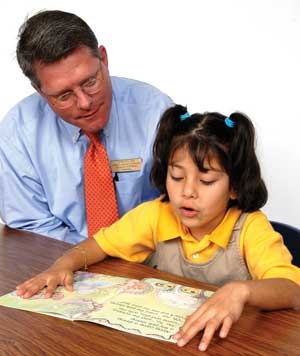Training for Teacher Leaders
Reading Recovery teacher leaders are key people with a complex role requiring a wide range of skills obtained in a full academic year of professional development
They are leaders in their local districts where they teach children, train Reading Recovery teachers for local schools, maintain contact with past trainees, analyze and report student outcomes, educate the local educators, advocate for what cannot be compromised, and communicate with the public.
Teacher leaders are selected by a school district or consortium of districts that has made a commitment to implement Reading Recovery. The teacher leader candidate attends a registered university training center in the United States or a regional institute in Canada for an academic year of full-time professional development. For more details about requirements for teacher leader selection and professional development see the Standards and Guidelines for the United States and for Canada (PDF). Teacher leaders in the U.S. must have a master’s degree. Candidates in both countries must have teaching credentials, effective teaching experience, and leadership potential.
The teacher leader candidate attends a registered university training center in the United States or a regional institute in Canada for an academic year of full-time professional development. Their complex role requires them to
- become Reading Recovery teachers
- develop an academic understanding of the theoretical concepts upon which Reading Recovery is based and a flexibility to consider new concepts and practices
- test practice against theoretical concepts
- critically appraise Reading Recovery’s strengths and problem spots as well as competing explanations for its success
- observe and work through the experiences of a teacher trainee group across an academic year with the support of experienced teacher leaders in the field
- help teachers develop competency in individualized assessment-based instruction to improve student achievement
- become skilled at working with adult learners in order to effect significant change in teachers’ practice
- develop a thorough knowledge of the whole operation of Reading Recovery in an education system including organizing and administering the teacher training course and evaluating and reporting student outcomes
- become skilled at working with local administrators (e.g., site coordinator, principals)
- develop interactive system-level leadership skills
In order to accomplish these goals during the initial year of professional learning, teacher leader candidates teach Reading Recovery students daily; participate in graduate-level classes at an authorized training center that include teaching sessions; engage in course work to explore theoretical concepts in reading, writing, language, literacy difficulties, and adult learning theory; participate in leadership seminars and practica that include field work at established sites; and prepare their home districts for Reading Recovery implementation.
As long as they are in the role, teacher leaders participate in regularly scheduled professional development sessions conducted by university trainers. They also attend a national or regional conference each year and participate in an annual required national Teacher Leader Institute to ensure current knowledge about all aspects of their roles.
THE JOURNAL OF READING RECOVERY
Spring 2025
OPEN ACCESS: Centering Children and Working Towards Equity: Teaching All Children to Read by Catherine Compton-Lilly
Literacy Leadership in Support of Equity: Whatever It Takes by Allison Briceño
Exploring the Purposes, Power, and Potential of Familiar Reading by Jamie Lipp
Full Circle: From Student to Psychologist by Joyce Romano


